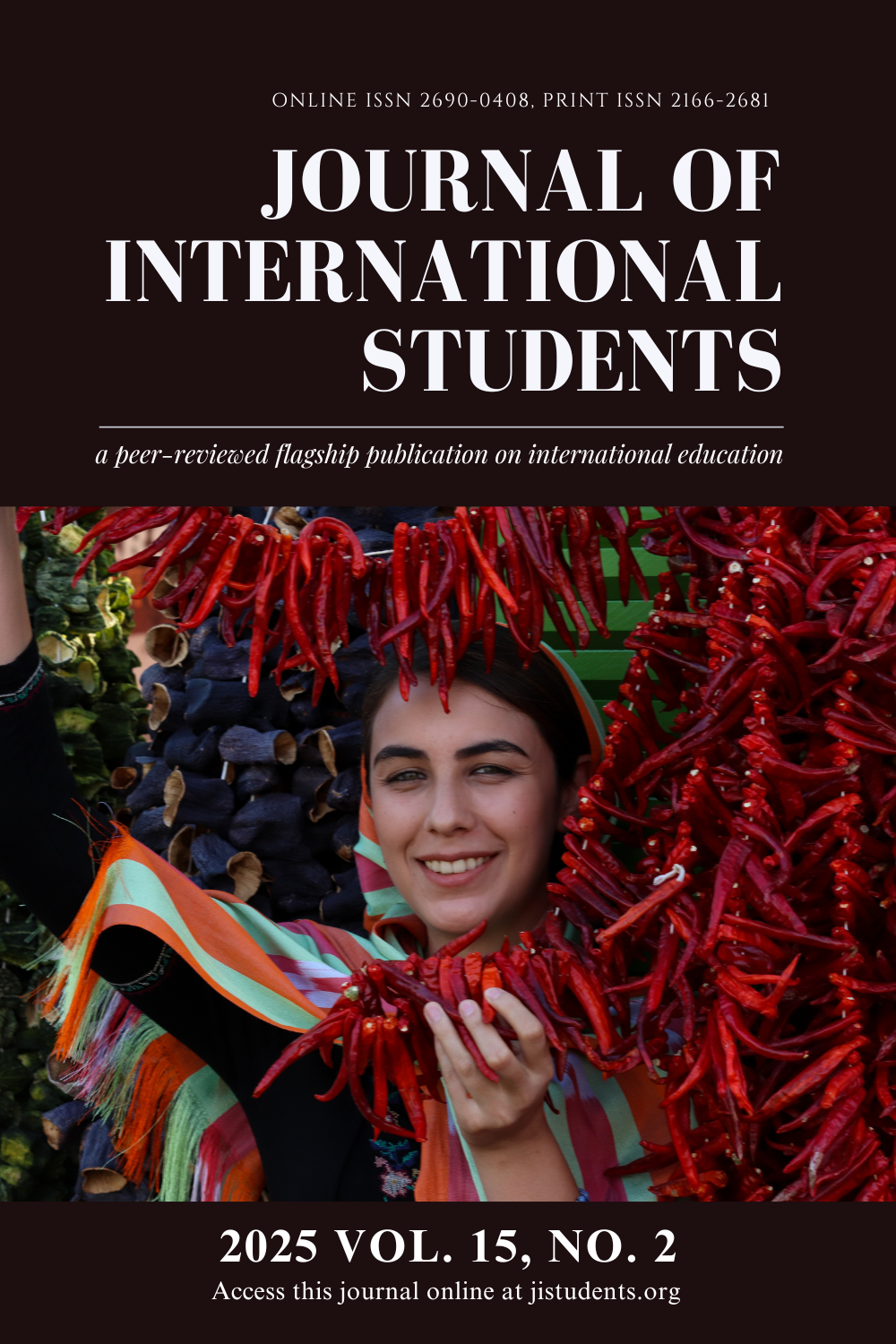An empirical study on intercultural contact and intercultural communication competence of Chinese international students in the UK
A case study of Lancaster University
DOI:
https://doi.org/10.32674/xtpdzb48Keywords:
intercultural contact, intercultural communicaiton, Acculturation, international studentsAbstract
This study explores the relationship between intercultural contact (IC) and intercultural communication competence (ICC) among Chinese international students at Lancaster University, UK. Using a mixed-methods approach, the research analyzes the frequency and nature of IC and self-assessed ICC levels.Findings reveal a predominance of indirect IC, such as media consumption and cultural events, over direct interactions with native English speakers. Self-assessment of ICC indicates strong attitudes towards cultural diversity but identifies areas for improvement in domestic cultural knowledge and cognitive skills.Statistical analysis demonstrates a significant positive correlation between IC and ICC, with direct IC positively impacting communication skills and indirect IC contributing to cultural knowledge and positive attitudes.These findings emphasize the importance of both direct and indirect IC in developing ICC. Educational institutions should focus on facilitating diverse IC opportunities to enhance students’ language proficiency, cultural adaptation, and overall well-being.
References
Astley, M. (2024).Cross-cultural challenges faced by international students: A case study of Indian postgraduate students at a London-based Business School . Journal of International Students,14(4) 971-988. DOI: https://doi.org/10.32674/jis.v14i4.6765
Berry, J. W. (1992). Acculturation and adaptation in a new society. International Migration, 30(4), 69-85.https://doi.org/10.1111/j.14682435.1992.tb00776.x DOI: https://doi.org/10.1111/j.1468-2435.1992.tb00776.x
Berry, J. W. (2017). Theories and models of acculturation. In S. J. Schwartz & J. B. Unger (Eds.), The Oxford handbook of acculturation and health (pp. 15–28). Oxford University Press. DOI: https://doi.org/10.1093/oxfordhb/9780190215217.013.2
Byram, M, (1997). Teaching and assessing intercultural communicative competence.New York:Multilingual Matters.
Higher Education Statistics Agency. (2024). Where do HE students come from?https://www.hesa.ac.uk/data-and-analysis/students/where-from
Kormos, J. & Csizer, K. (2007). An interview study of intercultural contact and its role in language learning in a foreign language environment. System,35 (2): 241-252 . DOI: https://doi.org/10.1016/j.system.2006.10.010
Kormos, J.,Csizer K. & Waniec, J.(2014). A mixed-method study of language-learning motivation and intercultural contact of international students. Journal of Multilingual and Multicultural Development, 35(2):151-166.http://dx.doi.org/10.1080/01434632.2013.847940 DOI: https://doi.org/10.1080/01434632.2013.847940
Liu, M., & Chen, H. (2021). Direct contact as a primary factor in the development of intercultural communication competence: Evidence from Chinese international students. International Journal of Intercultural Relations, (76), 1-12.
Nadeem, M. U., & Zabrodskaja, A. (2023). A comprehensive model of intercultural communication for international students living in culturally diverse societies: evidence from China. Frontiers in Communication, (11):1-15. https://doi.org/10.3389/fcomm.2023.1332001 DOI: https://doi.org/10.3389/fcomm.2023.1332001
Peng, R.Z. & Wu, W.P. (2016).A study on the intercultural contact pathway of Chinese college students from the perspective of intercultural competence. Foreign Language World, 1,70-78. DOI: https://doi.org/10.1037/t57353-000
Peng, R.Z. & Wu, W.P. (2017).An analysis of intercultural competence development of college students under the background of ‘the Belt and Road Initiative’. Journal of Hubei University for Nationalities Philosophy and Social Sciences (03),183-188.https://doi.org/10.13501/j.cnki.42-1328/c.2017.03.033
Peng, R.Z. & Wu, W.P. (2018). A survey on Chinese college students’ intercultural contact. Foreign Language Research,(05),87-93.https://doi.org/10.16263/j.cnki.23 -1071/h.2018.05. 015
Wu, W.P., Fan, W.W., & Peng, R.Z. (2013).An analysis of the dimensions and evaluation scales of intercultural competence of Chinese college students.Foreign Language Teaching and Research, 45(4),571-592.
Yin, Z., Ong,L.Z. & Qiao,M.(2024).Psychological factors associated with Chinese international students' well-being in the United States: A systematic review.Journal of International Students, 14(4) , 529-551. DOI: https://doi.org/10.32674/jis.v14i4.6428
Zhang, L. (2020). Developing students’ intercultural competence through authentic video in language education. Journal of Intercultural Communication Research, 49(4), 330-345.https://doi.org/10.1080/17475759.2020.1785528 DOI: https://doi.org/10.1080/17475759.2020.1785528
Zhong,H., Bai, Q.H., & Fan,W.W.(2013).A pilot study on the intercultural communicative competence self-report scale of Chinese college students.Foreign Language World,(3):47-56.
Downloads
Published
Issue
Section
Categories
License
Copyright (c) 2025 Journal of International Students

This work is licensed under a Creative Commons Attribution-NonCommercial-NoDerivatives 4.0 International License.
All published articles are licensed under a Creative Commons Attribution-NonCommercial-NoDerivs 4.0 Unported License.















